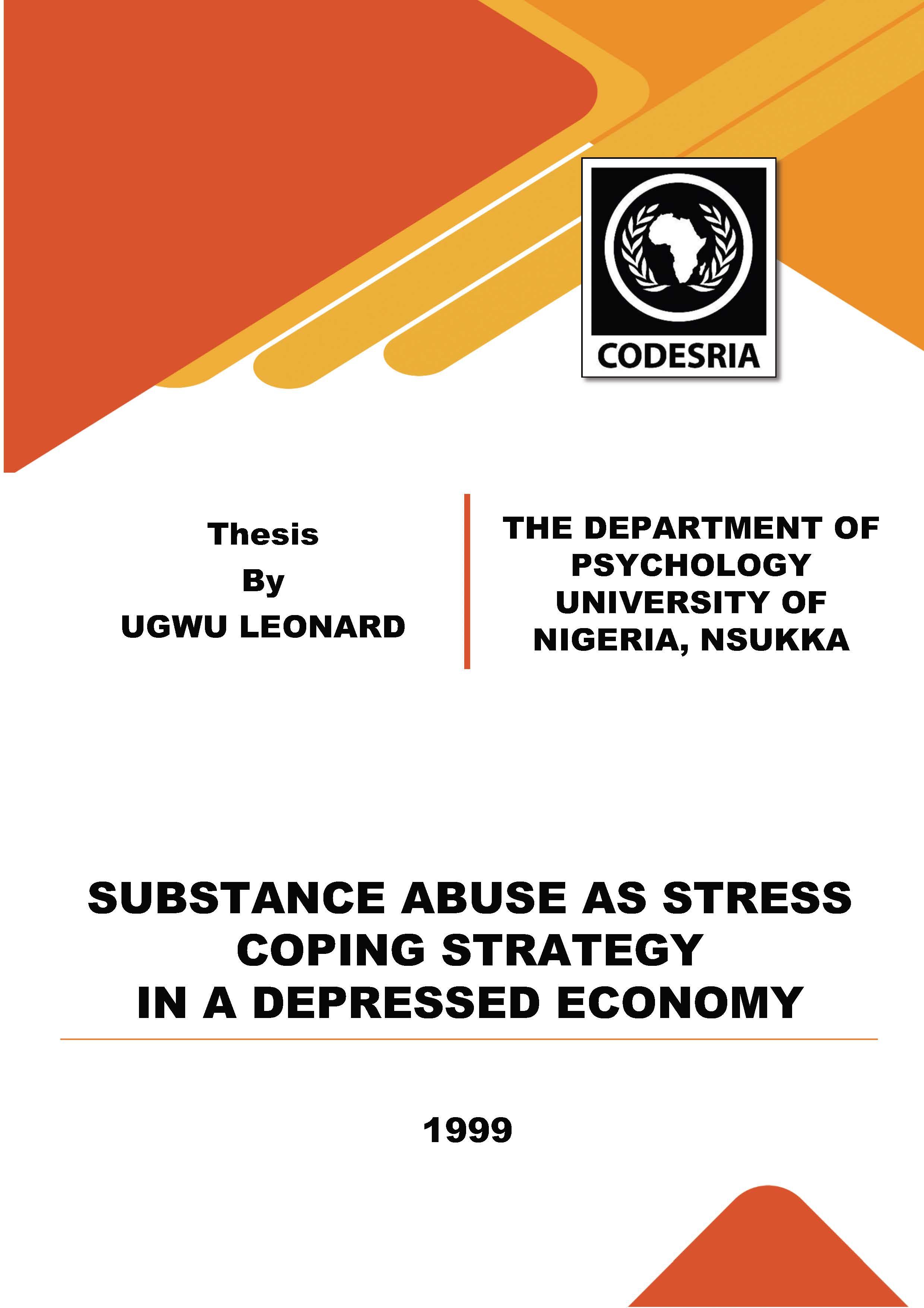SUBSTANCE ABUSE AS STRESS COPING STRATEGY IN A DEPRESSED ECONOMY
Mots-clés :
SUBSTANCE ABUSE, STRESS, STRATEGY, ECONOMYSynopsis
Substance abuse as stress coping strategy in a depressed economy was investigated in this study.
A sample of 236 participants (198 females and 38 males) were selected from schools located in rural and urban areas. Tlie participants are all teachers in the selected schools.
Two instruments were used in this study namely: (i) a 20-item stressful life events questionnaire and (ii) a 15-item substances of abuse questionnaire. These two instruments were developed and validated by the researcher. The following hypotheses were tested:
1. There will be positive relationship between perceived stress and substance abuse.
2. More males than females will indulge in substance abuse when faced with stressful life events.
3. Married people will engage in more frequent subsfance abuse than their counterparts who are single.
4. Literate urban dwellers will indulge in m9re substance abuse than the literate rural dwellers.
5. Married people will experience more stress than their counterparts who are not married.
The Pearsori-r and Analysis of Variance (ANOVA) statistics were used to analyze the data. Results of the Peason-r indicated that there was a significant positive relationship between felt stress and frequency of substance usage. The higher the individual's
reported level of felt stress, the higher the level of substance usage. (p < 0.05). r
Further analyses revealed that more males than females indulge in substance abuse as stress coping strategy (p < 0.05).
Married people reported higher frequency of substance use than their counterparts who are unmarried (p < 0.01).
The result also revealed that there was rm significant differenc;e between urban and rural dwellers on the frequency of drug use. The findings and the limitations of the study were discussed and some of their implications and areas of future research highlighted.
Téléchargements
Références
Blau, C.J. (1987). "Using a Person-Environment Fit Model to Predict Job Involvement and Organizational Commitment. Journal of Vocational Behaviour, 30, 227°257.
Blum, E.M. (1966). Psychoanalytic Views of Alcoholism. Quarterly Journal of Studies on Alcohol, 27, 209-211.
Brower, K.J. & Angelin, M.D. (1987). Adolescent Cocain Use: Epidemiology, Risk Factors and Prevention. Drug Education, 17, 163-180.
Bunce, D. (1997). What Factors are Associated with Outcome of Individual Focused works site Stress Management and Intervention. Journal of Occupational and Organizational Psychology, 70, 1-17.
Carjo, K., Hogland, B. & Smedby, B. (1988). Psychotropic Drug use in a Swedish Community-Patterns of Individual use During Two Years. Social Science medicine, 27, 263-267.
Carlson, B.R. & Davis, J.L. (1988). Demographic Variables and Recreational Substance use Among College Students. Journal of Drug Education, 18, 71-79.
Carroll, C.R. (1989). Drugs in Modem Society. Dubugue: Brown.
Cohen, S. & Wills, T.A. (1985). "Stress, Social Support and the Buffering Hypothesis" Psychological Bulletin, 98, 310-357.
Conger, J.J. (1956). Alcoholism, Theory, Problem and Challenge II: Reinforcement Theory and Dynamics of Alcoholism. Quarterly Journal of Studies in Alcohol, 17, 296-305.
Cornwell, A. & Cornwell, V. (1993). Drugs Alcohol and Mental Health. New York: Cambridge University Press.
Crider, A.B., Goethals G.R., Kavanaugh, RD., Solomon, P.R. (1983). Psychology. New Jersey. Scott, Foresman & Company.
Davis, R. (1990). Alcohol and Stress Management. In R.I. Shader (Ed.), Manual of Psychiatric Therapies. Boston: Little Brown Company.
Dobson, C. (1980). Sources of Sixth form Stress. Journal of Adolescence, 3, 65-75.
Doweiko, H. (1990). Concepts of Chemical Dependency. California: Brooks/Cole Publishing Company.
Drew, L.I. (1988). Acculturation Stress and Alcohol Usage Among Canadian Indians in Toronto. Canadian Journal of Public Health, 79, 115-118.






